In recent years, investors and homebuyers have been captivated by the allure of off-grid real estate.
As traditional energy resources face rising costs and increased scrutiny, the independence and sustainability offered by off-grid living becomes more attractive. Understanding the benefits of investing in off-grid properties can not only support environmental goals but also offer financial advantages.
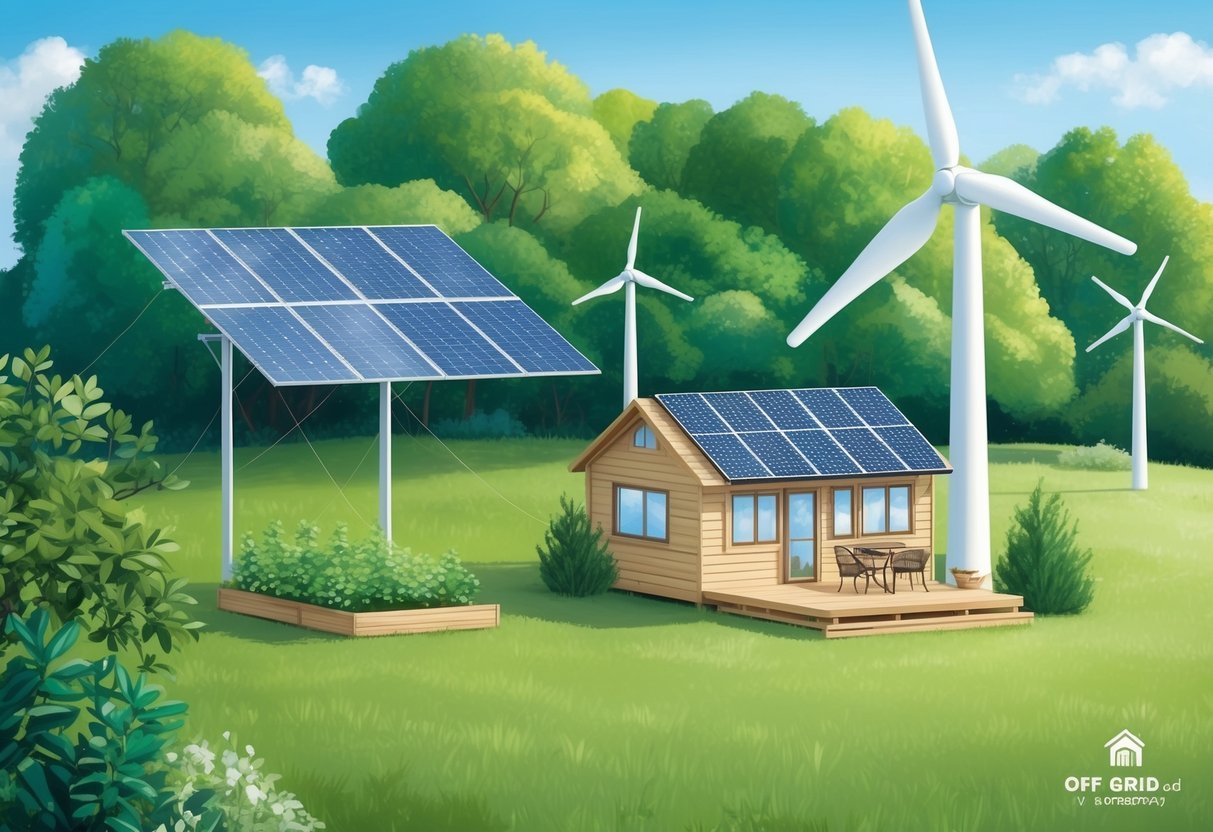
As we explore the advantages of these unique properties, it’s important to consider the potential for cost savings and energy efficiency.
The growing trend towards self-sustainability presents opportunities for innovation in housing and real estate investment.
By evaluating the benefits, we can make informed decisions about whether off-grid real estate should be a part of our investment portfolios.
1) Energy Independence
When we invest in off-grid real estate, we open the door to true energy independence.
This independence allows us to detach from conventional power grids and establish our own energy sources.
It is a remarkable step towards self-reliance, as it enables us to produce and manage our own electric power through renewable resources like solar panels or wind turbines.
By harnessing renewable energy, we significantly reduce our reliance on fossil fuels.
This not only helps in lowering our carbon footprint but also shields us from fluctuating energy prices.
Such autonomy ensures that our costs remain stable and predictable, a compelling advantage for any property owner.
Furthermore, off-grid homes offer resilience in the face of power outages.
With an independent power system in place, we continue to enjoy an uninterrupted energy supply while others may experience disruptions.
This reliability is particularly beneficial in remote areas, where access to public utilities is limited.
To maximize this independence, we need to incorporate efficient energy storage solutions.
Batteries and other energy storage technologies allow us to store surplus energy for use during periods of low production.
This ensures that energy is available even when the sun isn’t shining or the wind isn’t blowing.
2) Reduced Utility Costs
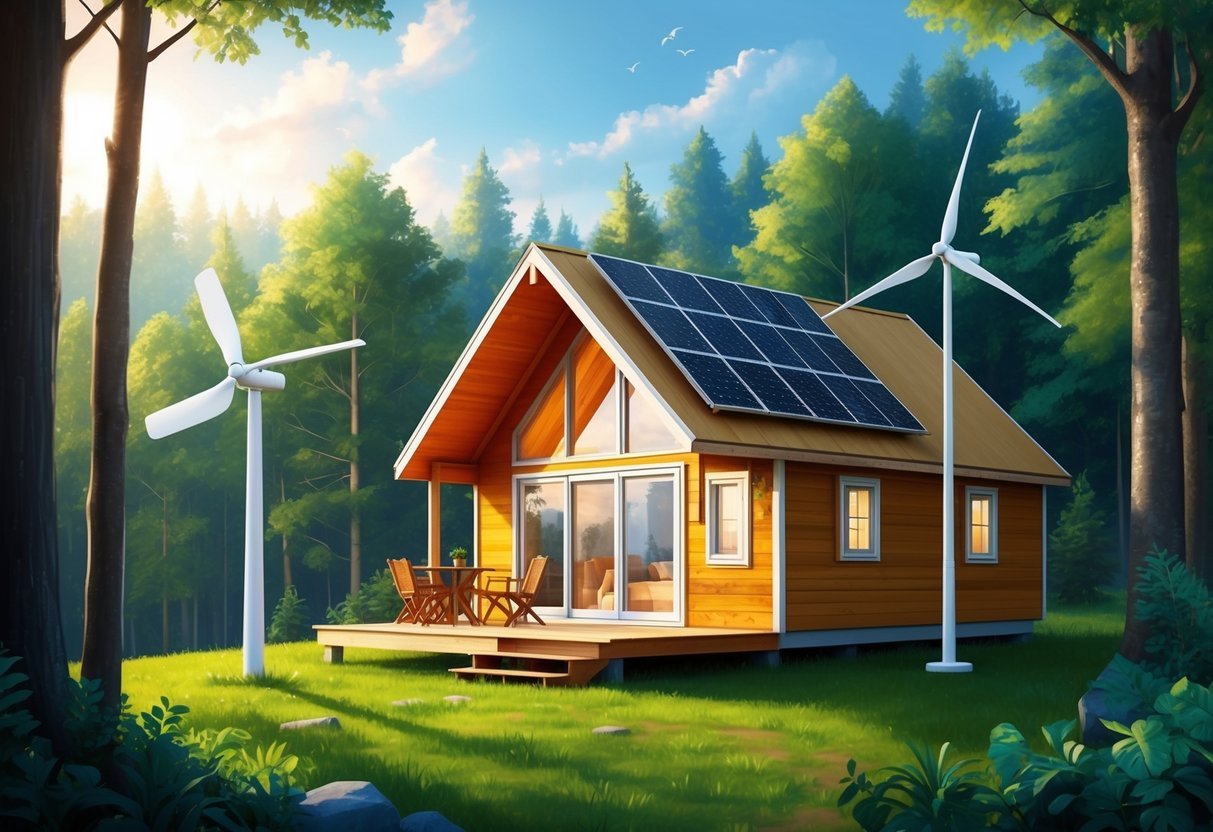
When we invest in off-grid real estate properties, one of the significant advantages we encounter is the reduction in utility costs.
By harnessing renewable energy sources such as solar panels or wind turbines, we can dramatically cut down our reliance on traditional power grids.
This shift not only lowers our monthly expenses but also offers us greater energy independence.
Imagine slashing utility bills by up to 80-100% after the initial investment in renewable technologies.
While the upfront cost might seem substantial, the long-term savings make it a worthwhile financial consideration.
Moreover, as energy prices fluctuate, having a fixed investment in renewable sources shields us from these unpredictable changes.
The benefits extend beyond electricity.
By using rainwater harvesting systems and composting toilets, we can also reduce our water and waste disposal bills.
These systems are effective not just in conserving resources but also in decreasing the overall operational costs of maintaining an off-grid property.
Many off-grid solutions come with increased efficiency.
Advances in battery storage and energy management systems mean we can optimize the use of the energy we produce.
This ensures that nothing goes to waste and that our investment reaps maximum benefits in terms of cost reduction.
Increased Property Value
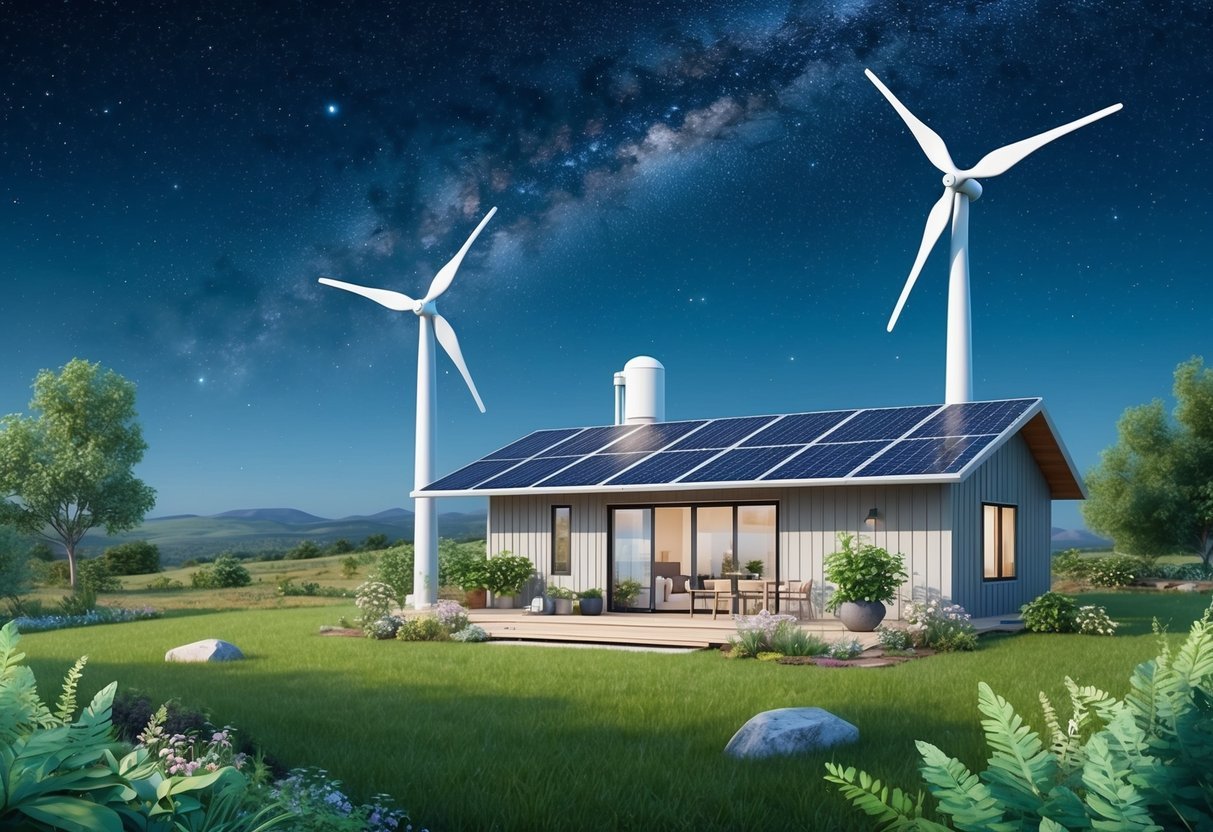
Investing in off-grid real estate can lead to increased property value, offering the potential for considerable returns.
As more individuals seek sustainable living solutions, the demand for off-grid properties is growing.
This trend can significantly enhance the value of these properties in the real estate market.
Given their unique setup, off-grid homes often stand out, attracting niche buyers interested in self-sufficiency and environmental responsibility.
These features position off-grid properties as desirable investments.
They not only appeal to those seeking independence from traditional utility systems but also resonate with eco-conscious buyers.
Location plays a crucial role in determining value.
Off-grid properties situated in picturesque or sought-after areas can see their value rise more rapidly.
Potential buyers are often willing to pay a premium for the combination of scenic beauty and sustainable living options.
Another factor contributing to increased property value is the cost savings associated with off-grid living.
Without reliance on standard utilities, owners can enjoy reduced monthly expenses.
These savings can be a significant selling point, making properties more attractive to prospective buyers.
It’s also essential to consider the advancements in technology that support off-grid living.
Modern innovations in solar energy, water filtration, and waste management have made these homes more efficient and appealing.
This incorporation of technology can boost the property’s appeal and market value.
4) Sustainable Living
Investing in off-grid real estate presents an opportunity to embrace sustainable living.
We can significantly reduce our environmental footprint by choosing properties designed to utilize renewable energy sources, such as solar panels or wind turbines.
This shift not only benefits the environment but also enhances the value of our investment in the long run.
Our reliance on traditional utilities decreases with off-grid living, encouraging us to adopt self-sustaining practices.
These properties often incorporate eco-friendly building materials and support practices that conserve water and minimize waste.
By integrating these elements, we create a living environment that harmonizes with nature while promoting resource efficiency.
We also find ourselves part of a growing movement toward sustainable community involvement.
Fostering a lifestyle that prioritizes energy independence and minimal environmental impact resonates with today’s increasing emphasis on green living.
This appeal is not just personal but can enhance the overall marketability and desirability of the properties we invest in.
Moreover, we gain the advantage of controlling and customizing our energy needs.
Off-grid properties allow us to adjust to seasonal changes and personal preferences, all while employing sustainable technologies.
The flexibility of these systems ensures that we manage the resources efficiently, which is a smart financial decision as energy costs continue to rise.
The autonomy of off-grid living encourages innovation and adaptation.
We develop creative solutions to the challenges posed by resource limits and environmental concerns.
This proactive approach aligns with our commitment to sustainability, enabling us to live responsibly while enjoying the benefits of off-grid investments.
Enhanced Privacy
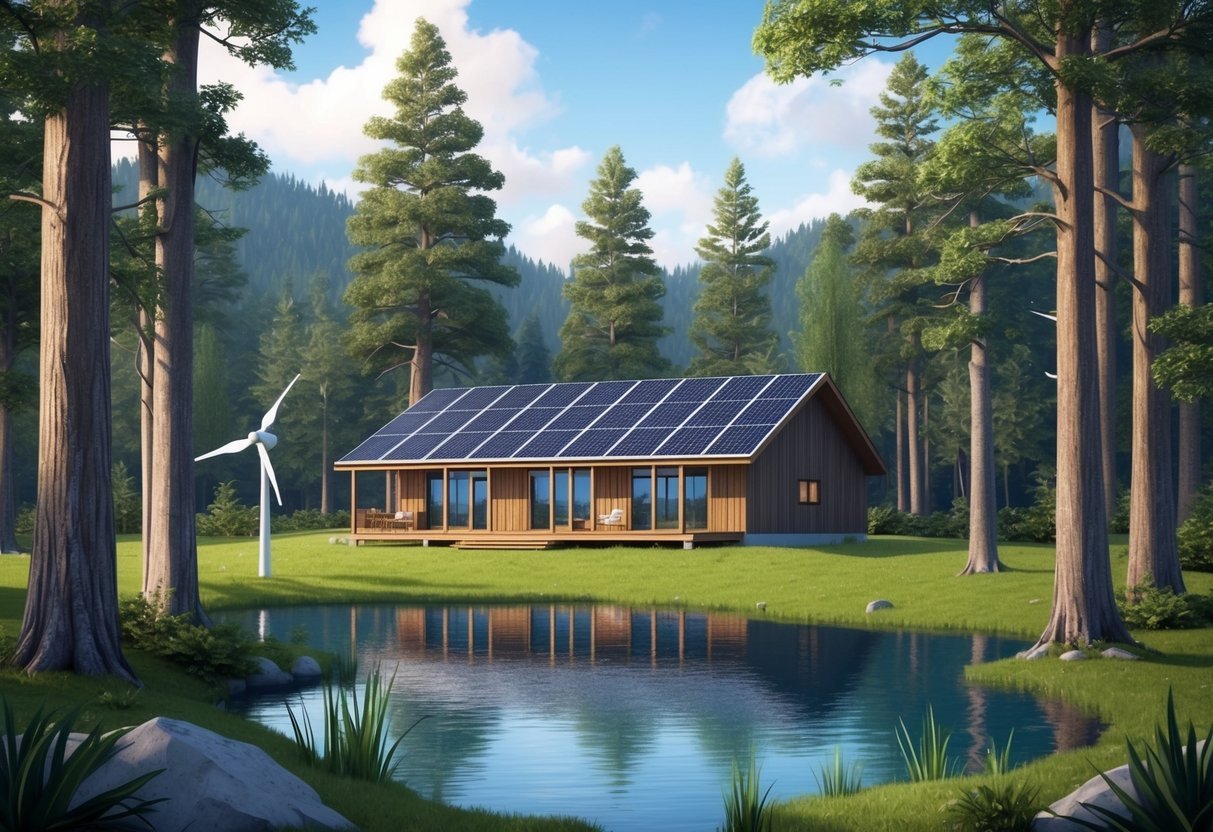
When we invest in off-grid real estate properties, one of the most enticing advantages is the enhanced privacy they offer.
These properties are typically located in remote areas, away from crowded urban centers.
This seclusion provides an escape from the hustle and bustle of city life, allowing us to enjoy tranquility and solitude.
Living off the grid often means fewer neighbors, which naturally reduces the chances of disturbances.
For those of us seeking a calm and peaceful environment, off-grid living provides an ideal setting.
There’s a certain appeal in knowing that our nearest neighbor could be miles away.
The lack of traditional infrastructure also contributes to our privacy.
With limited road access and no reliance on public utilities, off-grid properties create a buffer that maintains our personal space.
This setup ensures that only those we wish to see can easily find us.
We can enjoy our environment without the constant buzz of traffic or the hum of nearby industry.
This remoteness provides peace of mind for individuals who value discretion and seclusion in their daily lives.
Such privacy is particularly beneficial for those working from home or engaged in creative enterprises.
The isolation encourages focus without the usual interruptions from city living.
It allows us to create without constraints, harnessing the beauty of unspoiled surroundings to inspire our work.
6) Remote Work Capabilities
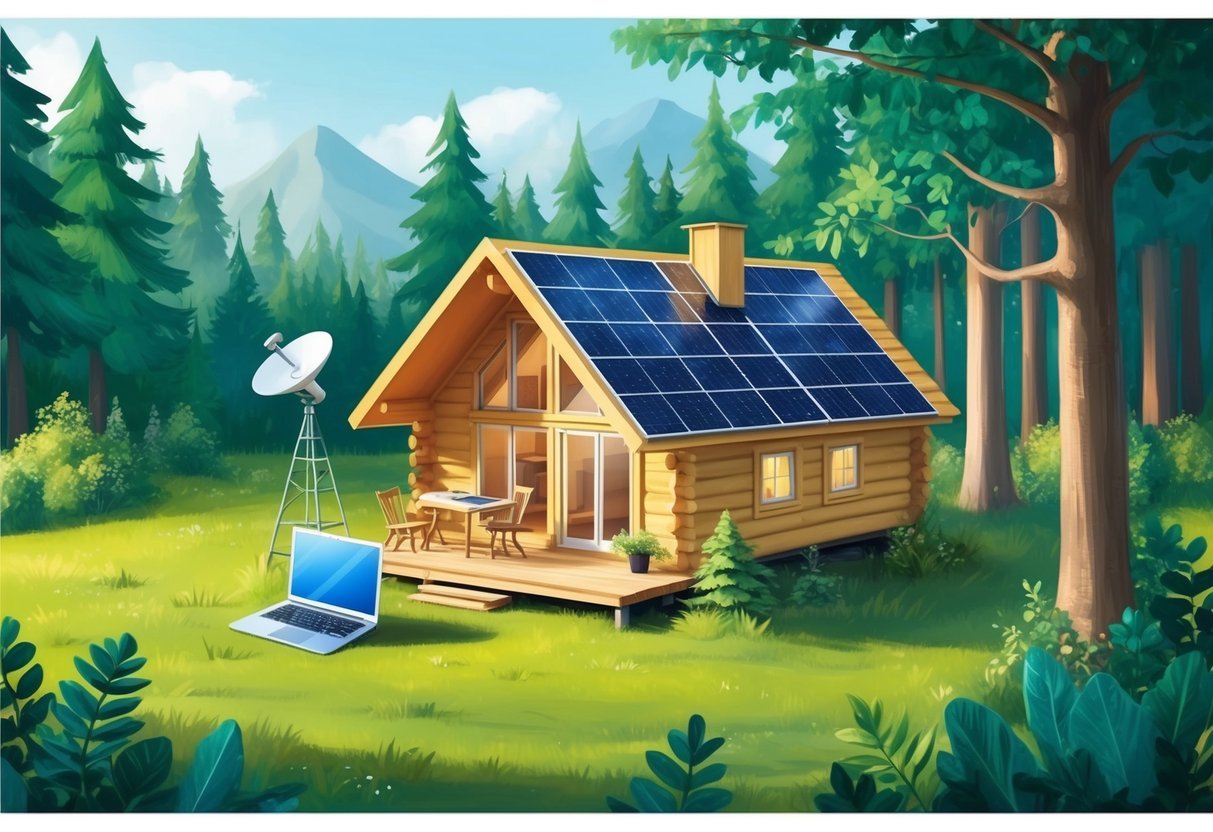
As we embrace the shift towards remote work, off-grid real estate properties offer ideal environments for such flexibility.
These locations allow us to set up efficient home offices free from urban distractions.
We can enjoy the serenity and focus needed to work productively, enhancing our work-life balance without the hustle and bustle of city life.
With the advancements in technology, establishing a reliable internet connection even in remote areas has become increasingly feasible.
This enables us to stay connected with colleagues and clients while enjoying the peace and quiet of a secluded property.
Solar panels and other renewable energy sources can power our devices, ensuring sustainable energy supply.
Furthermore, off-grid properties offer us an opportunity to blend work with leisure.
The surrounding nature provides avenues for relaxation and inspiration, improving our overall well-being.
We can take breaks by enjoying the scenic views, hiking nearby trails, or even indulging in local outdoor activities.
Investing in such properties allows us to tap into locations that are less crowded yet equipped with the necessary amenities for remote work.
As we transition more into a digital world, having an off-grid property can provide unique advantages that support our evolving work routines.
7) Lower Carbon Footprint
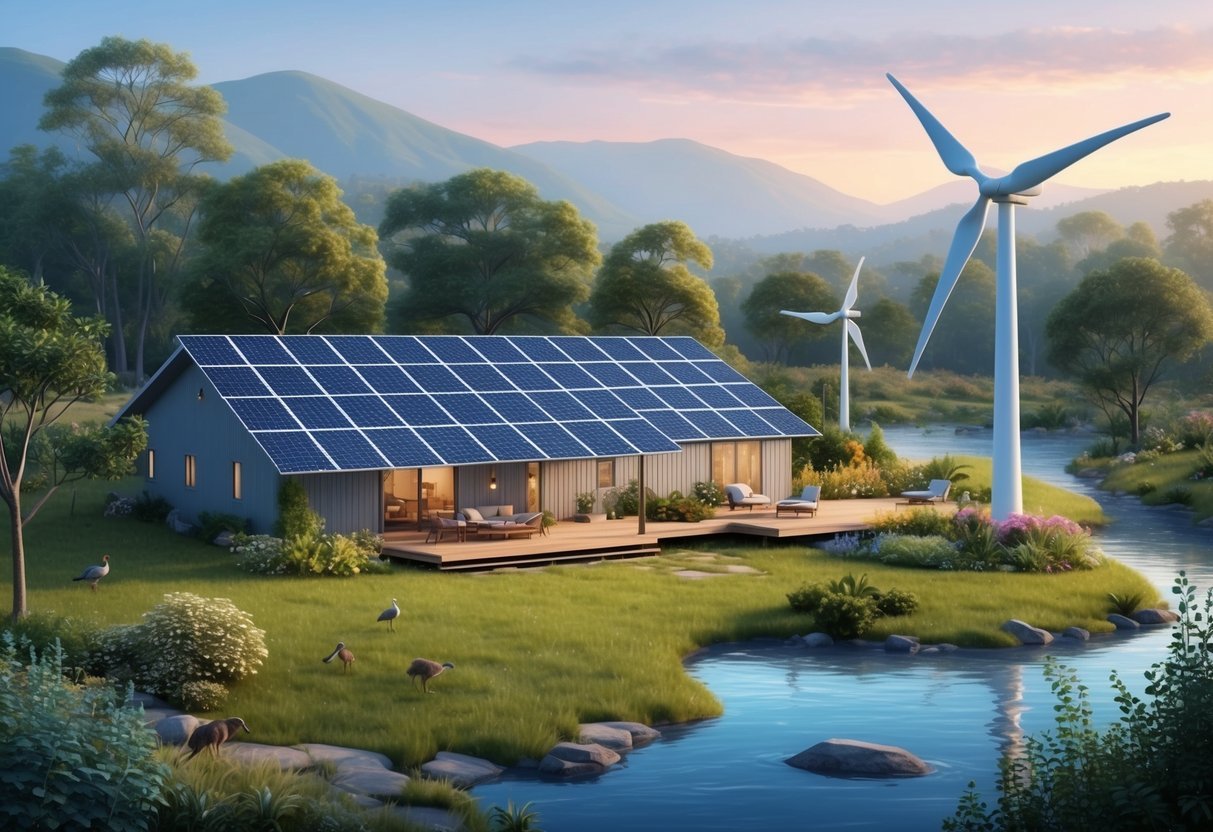
Investing in off-grid real estate properties offers the advantage of reducing our carbon footprint.
By using renewable energy sources such as solar, wind, or hydroelectric power, we decrease reliance on fossil fuels.
This not only helps limit emissions but also fosters sustainability.
Incorporating energy-efficient technologies and sustainable building materials further enhances the environmental benefits.
Using locally sourced and eco-friendly materials minimizes transportation emissions and supports the local economy.
Eco-friendly waste management systems play a vital role in maintaining a low carbon footprint.
Composting, recycling, and gray water systems effectively minimize waste and conserve resources.
Incorporating smart home technology can optimize energy use, ensuring that the property is as efficient as possible.
Monitoring and controlling energy consumption in real-time helps us recognize and eliminate wasteful practices.
These practices collectively contribute to a more sustainable and responsible way of living.
As off-grid properties become more popular, they demonstrate a tangible commitment to environmental stewardship.
As investors, exploring these options positions us at the forefront of a forward-thinking movement.
8) Access to Natural Surroundings
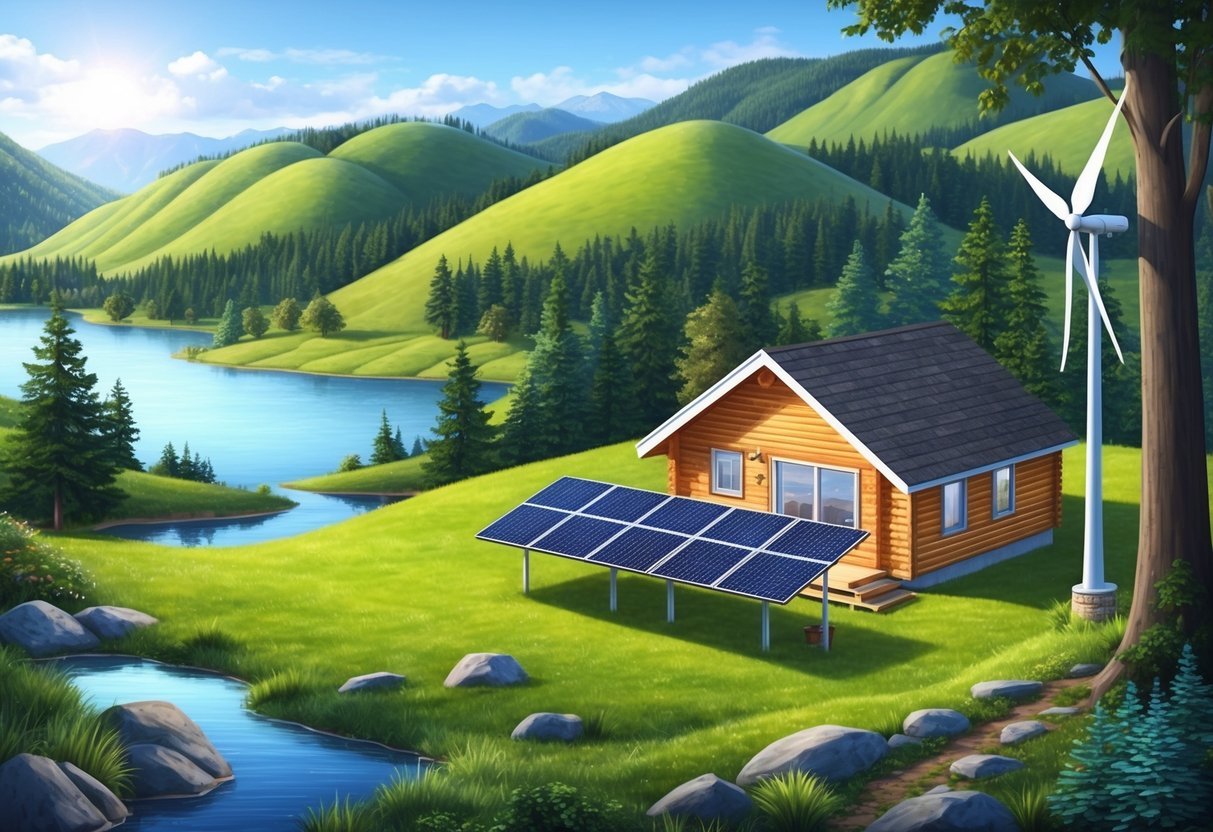
When we invest in off-grid real estate properties, one of the most appealing aspects is the opportunity to immerse ourselves in nature.
These properties are often located away from bustling urban centers, offering a serene and peaceful environment.
Being close to nature provides numerous benefits.
We can enjoy fresh air and open spaces, which contribute to our overall well-being.
The lack of noise pollution and the presence of greenery have calming effects on the mind and body.
Many off-grid properties are situated near expansive landscapes, such as forests, mountains, or lakes.
This not only increases the aesthetic value of the land but also attracts various wildlife species, offering a unique experience for nature lovers.
Spending time in these natural settings can help us rediscover a simpler lifestyle.
We can engage in outdoor activities like hiking, swimming, and fishing, which are often possible right at our doorstep.
This connection to the land encourages us to lead a more active lifestyle.
Moreover, the stunning views and natural beauty can enhance the property’s appeal for potential buyers or renters.
The value of experiencing the changing seasons in such settings is something many people cherish.
Off-grid locations promote environmental stewardship.
We become more aware of the impact we have on our surroundings, inspiring sustainable practices in our daily lives.
Living in harmony with nature fosters a sense of responsibility for preserving these areas for future generations.
9) Tax Incentives
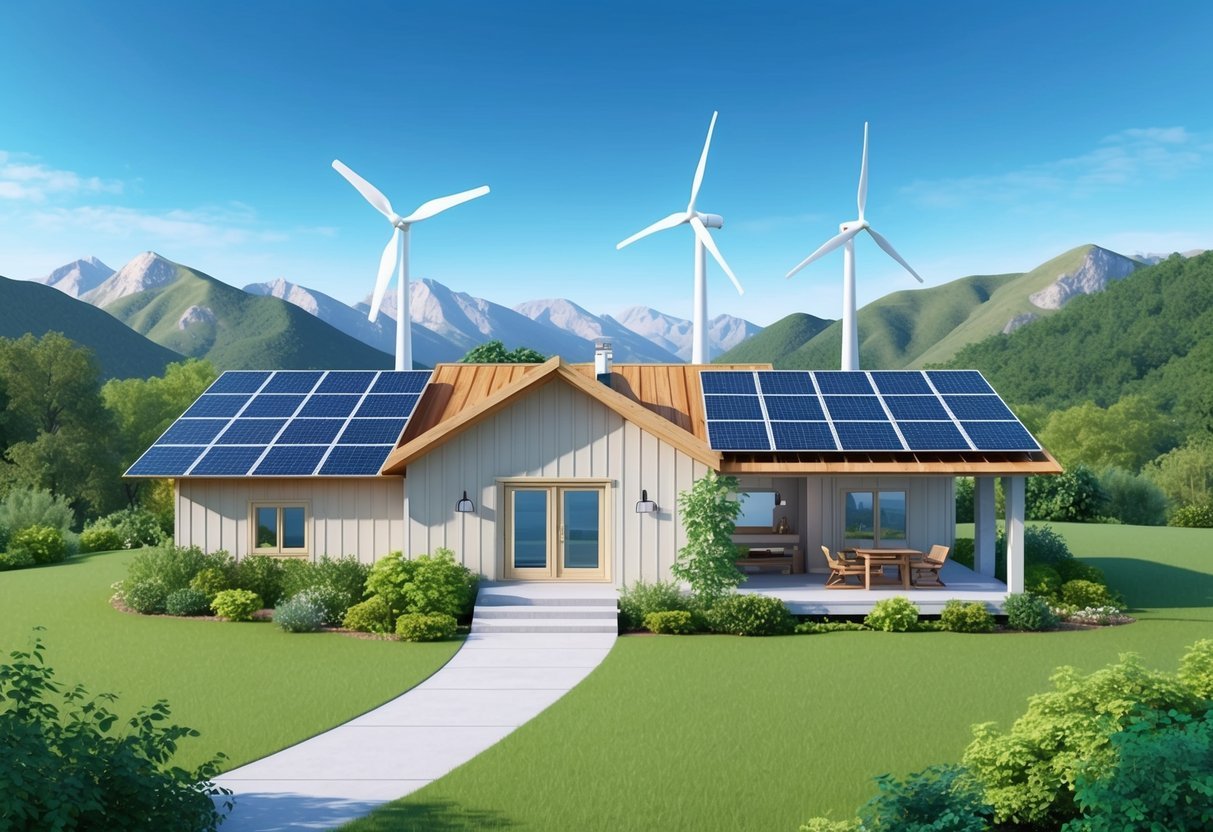
Investing in off-grid real estate properties comes with notable tax incentives.
These benefits can significantly impact our financial returns.
Tax deductions are among the key advantages, encompassing expenses such as mortgage interest and property depreciation.
By strategically utilizing these deductions, we can lower our taxable income.
This reduction can lead to significant savings, particularly for those managing multiple real estate assets.
Depreciation allows us to write off the gradual decrease in value of the property over time.
This deduction helps reduce our reported income, and potentially lessen our tax liability.
This advantage is particularly appealing in the realm of real estate.
Besides, we may benefit from the tax write-offs available on expenses related to property management and improvement.
Repairs, utilities, and certain maintenance costs can often be deducted, lessening the potential tax burden.
For properties classified as rental investments, there are additional advantages.
We can potentially qualify for pass-through deductions, providing further tax relief.
It’s essential to stay informed about existing and new tax incentive programs.
Such programs might support eco-friendly upgrades to off-grid properties or promote alternative energy use.
These programs can align with our investment goals and provide further savings.
Understanding Off-Grid Real Estate
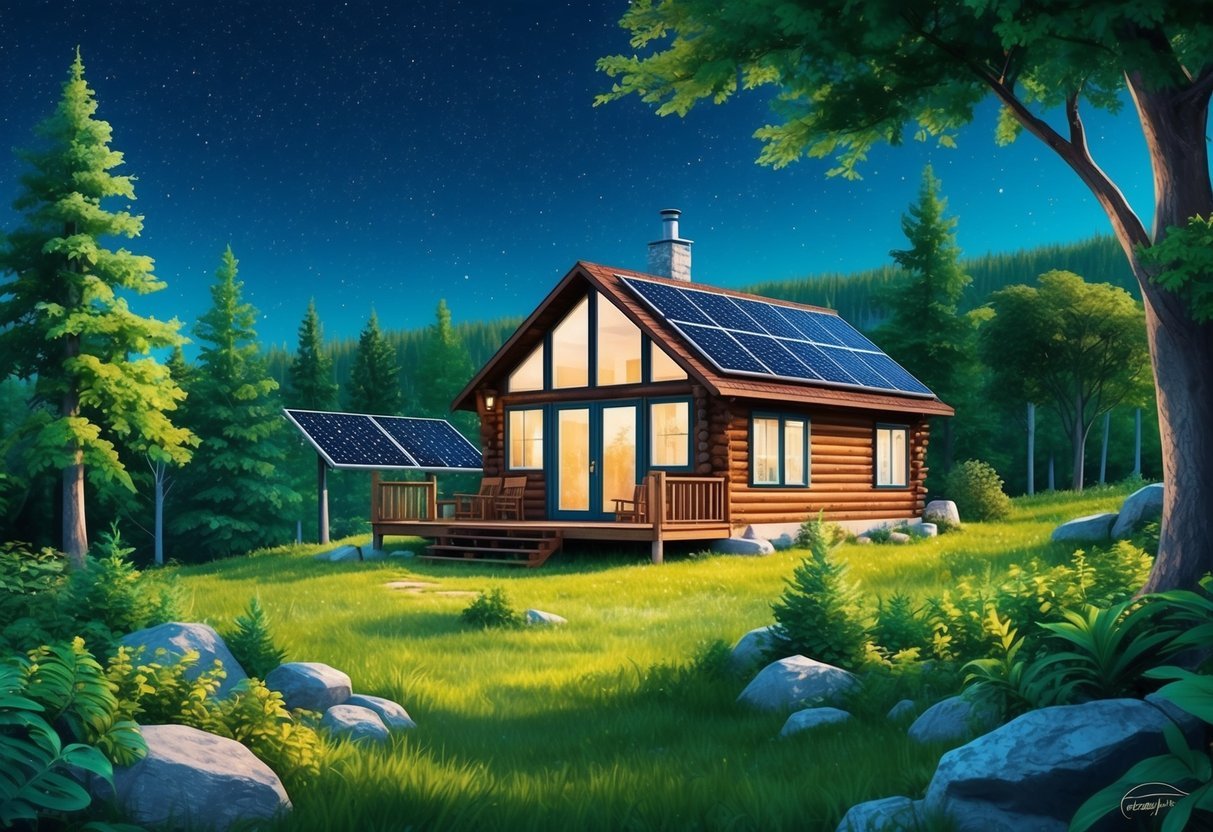
Off-grid real estate properties offer unique opportunities for sustainable living.
These properties often feature independent systems for water, energy, and waste management, making them a great asset for those seeking autonomy and minimal environmental impact.
What Defines Off-Grid Living?
Off-grid living is characterized by self-sufficiency and independence from public utilities like electricity, water, and sewage.
In off-grid homes, energy is usually sourced from renewable means such as solar panels or wind turbines.
Meanwhile, water systems might include rainwater collection or wells.
Waste disposal often leverages composting toilets and greywater systems.
This lifestyle appeals to environmentally-conscious individuals and those desiring more independence.
Reduced utility bills and a lower carbon footprint are key benefits, while challenges can include initial setup costs and ongoing maintenance of systems.
Types of Off-Grid Properties
There are various types of off-grid properties, each suited for different lifestyles and preferences.
Tiny homes and cabins are popular choices for those looking to scale back on space and reduce overall energy usage.
Meanwhile, farms and ranches provide opportunities for both off-grid living and self-sustaining agriculture, making them ideal for those interested in farming.
Some opt for off-grid communities, where resources and responsibilities are shared among residents.
On the other hand, remote plots offer immense privacy and freedom, though they may require more work to develop.
Each type provides distinct advantages, allowing investors to choose based on their priorities and lifestyle goals.
Advantages for Investors
Investing in off-grid real estate properties offers enticing benefits.
These include the potential for high returns on investment, attractive tax incentives, and a growing demand for sustainable living solutions.
High ROI Opportunities
In off-grid real estate, returns on investment can be quite lucrative.
The absence of traditional utility expenses means reduced operational costs, enhancing profitability.
Locations with favorable conditions can yield a return on investment between 10% and 15%.
We can leverage renewable energy sources, such as solar or wind, to further cut expenses.
By selecting properties wisely, we maximize our potential gains.
Properties in areas where off-grid living is becoming popular can command higher resale values.
Additionally, these properties often appeal to a niche market keen on sustainable living, further driving demand and value.
Tax Benefits
One compelling reason to invest in off-grid properties is the potential tax advantages.
Many governments offer tax credits or incentives for adopting renewable energy solutions.
These include solar power installations and energy-efficient upgrades.
By utilizing these incentives, we can reduce our taxable income.
For instance, installing solar panels might result in a significant tax credit.
In certain regions, property tax reductions may apply to eco-friendly homes.
As we invest in sustainable solutions, the financial benefits extend beyond mere operating cost reductions.
This strategic approach not only helps our bottom line but also contributes to environmental sustainability.
Increasing Market Demand
The demand for off-grid living solutions is on the rise, fueled by increasing environmental awareness and a desire for independence from traditional utilities.
Many potential homeowners seek self-sufficient properties that align with their values.
The shift towards sustainable living is influencing real estate markets globally.
As more individuals prioritize eco-friendly and self-sustaining lifestyles, our investment in off-grid real estate stands to benefit.
By continuously monitoring this market trend, we can stay ahead and source properties that meet evolving consumer demands.
Sustainability and Self-Sufficiency
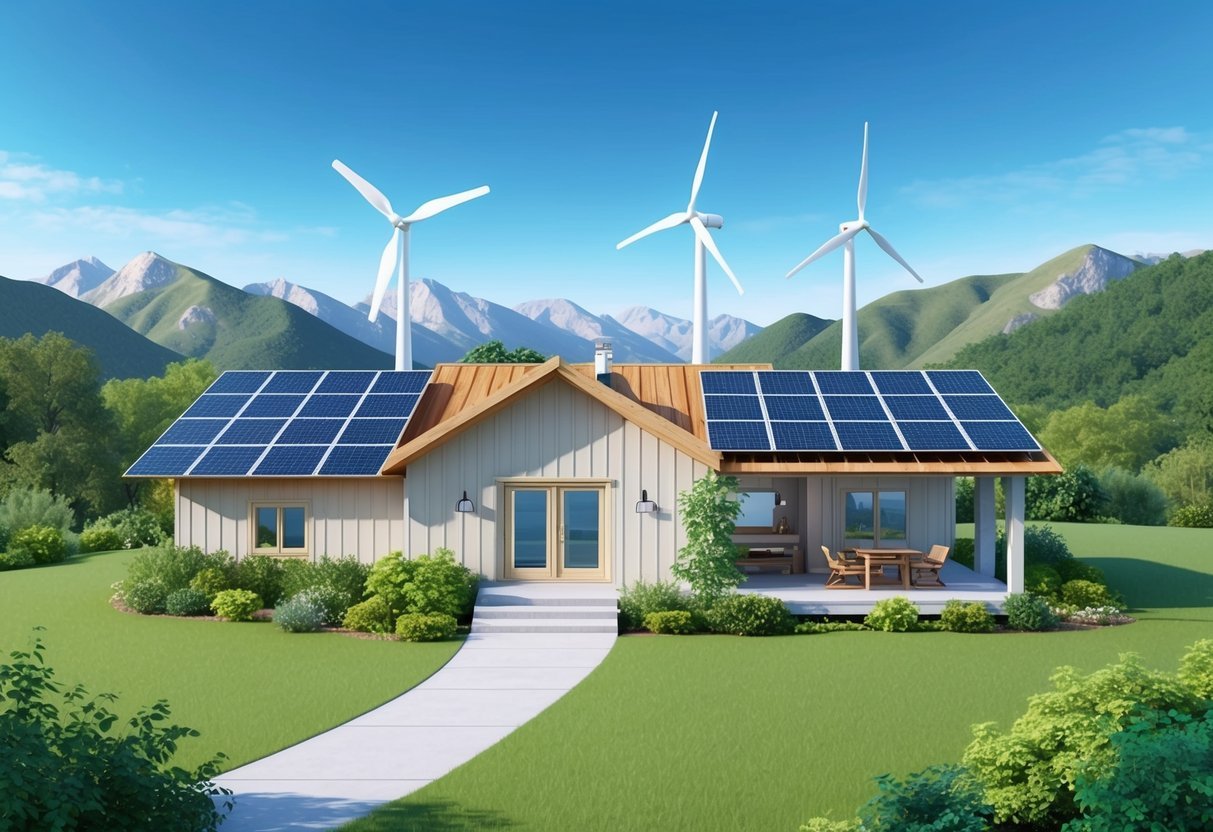
In off-grid real estate, implementing renewable energy systems and efficient water and waste management can transform properties into havens of self-sufficiency.
These elements not only reduce our environmental footprint but also offer financial and operational benefits.
Renewable Energy Solutions
A key component of sustainable off-grid properties is the integration of solar panels and wind turbines.
These technologies enable us to harness natural energy resources, reducing reliance on traditional power grids.
Solar panels, in particular, provide reliable energy, especially in areas with sufficient sunlight.
For areas with less sunlight, wind turbines can serve as a valuable alternative.
By using battery storage systems, we can store excess energy generated for use during non-peak times.
Combining these technologies offers a balanced approach to energy independence, which is crucial for off-grid living.
We should also consider energy-efficient appliances to maximize these benefits.
Water and Waste Management
Effective water and waste management is essential for ensuring self-sufficiency in off-grid properties.
Rainwater harvesting systems collect rainwater for use in day-to-day activities, significantly reducing the demand for external water sources.
Coupled with greywater recycling systems, these solutions allow us to reuse water, further conserving resources.
Waste management is equally crucial.
Composting toilets and natural wastewater treatment systems, like constructed wetlands, provide eco-friendly options to manage waste.
These technologies minimize environmental impact and can be tailored to fit different property layouts and sizes.
By prioritizing these sustainable practices, we enhance the self-sufficiency of our off-grid investments, providing long-term benefits for property owners and the environment.
Frequently Asked Questions
As off-grid real estate investments gain popularity, many seek clarity on the benefits, locations, and strategies to adopt this lifestyle.
Understanding available financing and value determinants can help ease the transition.
What are the primary advantages of choosing off-grid real estate investments?
Investing in off-grid properties offers us energy independence and significantly reduced utility costs.
By harnessing renewable sources, we benefit from sustainable living and often see increased property value.
Additionally, the enhanced privacy these locations provide is a notable consideration for many investors.
Which states are the most favorable for off-grid living?
When considering off-grid living, states like Colorado, Oregon, and Vermont regularly top the list due to their supportive regulations, ample natural resources, and established off-grid communities.
These states provide us with the environment and resources necessary for a successful off-grid lifestyle.
How can beginners transition to off-grid living effectively?
For those of us new to off-grid living, starting small ensures a manageable transition.
Gradually switching energy sources and focusing on self-sufficiency in water and food supply can make the shift smoother.
Joining local communities or seeking expert advice is also beneficial.
What are the financing options available for purchasing off-grid properties?
Securing financing for off-grid properties might require looking beyond traditional lenders.
We might explore specialized loans or cooperative financing options.
Understanding the property’s unique features and potential returns can also significantly aid in obtaining the necessary financial support.
In what ways can individuals living off-grid sustain their lifestyle financially?
Those of us living off-grid can sustain our lifestyle by leveraging multiple income streams.
Solar energy sales, agritourism, and small-scale agriculture can provide steady revenue.
Additionally, online work remains a popular choice due to minimal location constraints.
What are the main considerations when determining the value of off-grid living?
To determine the value of off-grid living, we need to examine its sustainability features, proximity to resources, and community support.
We also need to assess critical factors such as energy systems, land potential, and local market trends.

